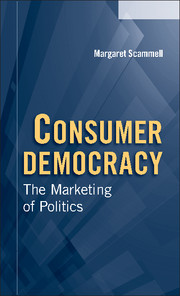Book contents
- Frontmatter
- Dedication
- Contents
- List of Tables, Figures, and Images
- Acknowledgments
- Preface: The U.S. Presidential Election of 2012
- Introduction
- 1 Political Marketing
- 2 Political Marketers
- 3 Political Brands
- 4 George W. Bush
- 5 Campaigning Effects
- 6 Citizen Consumers, Political Marketing, and Democracy
- Conclusion
- References
- Index
6 - Citizen Consumers, Political Marketing, and Democracy
Published online by Cambridge University Press: 05 June 2014
- Frontmatter
- Dedication
- Contents
- List of Tables, Figures, and Images
- Acknowledgments
- Preface: The U.S. Presidential Election of 2012
- Introduction
- 1 Political Marketing
- 2 Political Marketers
- 3 Political Brands
- 4 George W. Bush
- 5 Campaigning Effects
- 6 Citizen Consumers, Political Marketing, and Democracy
- Conclusion
- References
- Index
Summary
This chapter concerns the third task of this book: to consider whether and how marketing might enhance democratic politics, for parties and for citizens. Political marketing not only is compatible, but is predicted by economic theories of democracy (Schumpeter, 1943; Downs, 1957). However, it is one thing to recognize that marketing of some sort is inherent in competitive democracies, it is another to claim it as a potential force for good.
In part, as suggested in the introduction, the risk is to be too dependent upon dispiriting “realist” theories of democracy: Schumpeter’s elite competition in which the largely uninterested public exists primarily as a body to be mobilized at election times; and Downs’s view of instrumental rationality in which political actors calculate self-interest. Both theories explain the existence of political marketing, if not its precise form in practice. Moreover, these theories, even if widely criticized, have enduring analytical power and influence on practice (Hay, 2007; Shapiro, 2002). They direct us to the importance of political structures, particularly the design and regulation of electoral and media systems. The significance of democratic design has become a key area of contemporary political science research and is crucial to the development of a democratically controlled political marketing. However, both theories fall into the category that Barber (2003a) calls “thin” democracy; that is, they are relatively minimal models, seeking effective procedures for the protection of rights and the peaceful transfer of power between competitors for government, but have little to say about the encouragement of a more participatory democracy.
- Type
- Chapter
- Information
- Consumer DemocracyThe Marketing of Politics, pp. 138 - 162Publisher: Cambridge University PressPrint publication year: 2014



